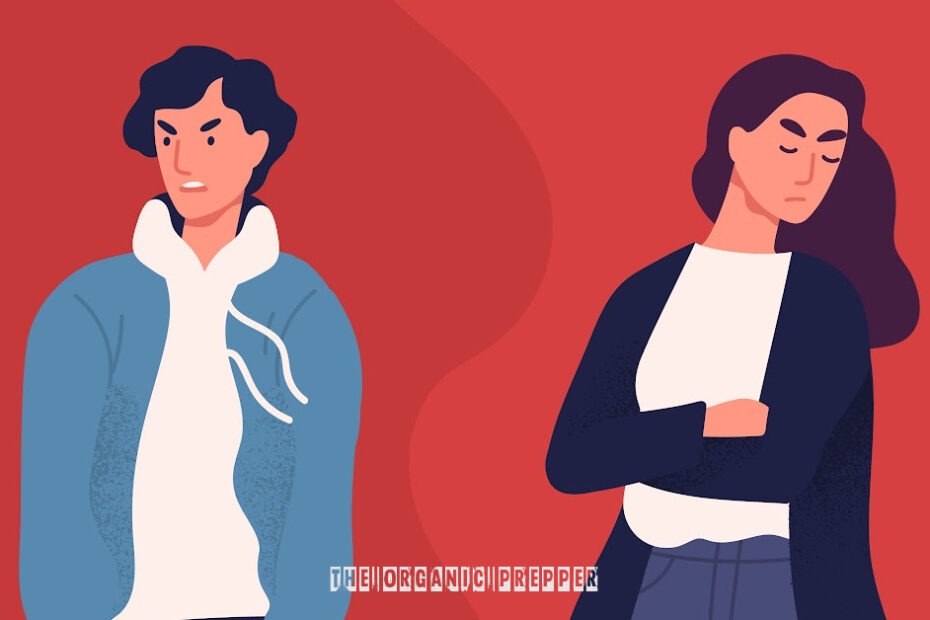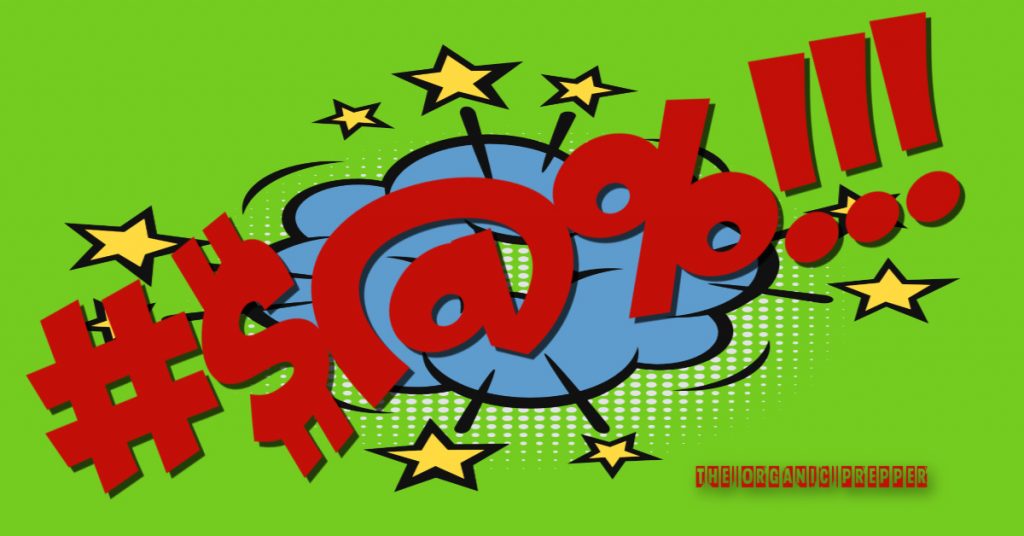[ad_1]
(Psst: The FTC wants me to remind you that this website contains affiliate links. That means if you make a purchase from a link you click on, I might receive a small commission. This does not increase the price you’ll pay for that item nor does it decrease the awesomeness of the item. ~ Daisy)
Author of Be Ready for Anything and Build a Better Pantry on a Budget online course
Remember the little rhyme you probably told your children to remember when someone said something mean to them?
Sticks and stones may break my bones but words will never hurt me.
Well, unless you’re part of Stanford University’s Elimination of Harmful Language Initiative. They’ve got a list of worst that are apparently hurtful, including… American.
The EHLI website is geared toward helping individuals recognize and address potentially harmful language they may be using. It focuses on terms used in the United States, starting with a list of everyday language and terminology that can be searched for and addressed at the individual level. (source)
There are 10 “harmful language” sections: ableist, ageism, colonialism, culturally appropriative, gender-based, imprecise language, institutionalized racism, person-first, violent and additional considerations.
Read on for more information on the mean words you’re probably using without realizing the inconceivable damage you may be inflicting on your more delicate acquaintances. Apparently, there are 300 offensive terms but the Stanford site requires a log-in so the following have been gathered from around the internet.
“Harmful” words
Here are some words and phrases that might offend someone. Is it okay to say that I’m gobsmacked?
Let’s kick this off (whoops, violent language!) with a warning from the site: Content Warning: This website contains language that is offensive or harmful. Please engage with this website at your own pace.
Cultural Appropriation
- Brave – which “perpetuates the stereotype of the “noble courageous savage,” equating the Indigenous male as being less than a man.”
- Guru – “In the Buddhist and Hindu traditions, the word is a sign of respect. Using it casually negates its original value.”
- Spirit animal: Equating it with an animal that guides or protects “is to demean the significance of the term.”
- Tribe – “Historically used to equate Indigenous people with savages.”
Imprecise Language
- Abort: This term can unintentionally raise religious/moral concerns over abortion. You should use cancel or end instead.
- American: You should use “U.S. citizen,” due to the insinuation “that the U.S. is the most important country in the Americas” even though the Americas are composed of 42 countries overall. (Note: I’ve traveled extensively outside the United States, and lived in two other countries in North America. Nobody EVER said “I’m an American too, you jerk!” or “You aren’t the only people in America.” Nope, everyone called me “an American.” Period.)
- Karen – This term is used to ridicule or demean a certain group of people based on their behaviors. However, it’s A-OK to use “demanding or entitled White woman” instead. Ummm…
- Thug – Although the term refers to a violent person or criminal, it often takes on a racist connotation when used in certain circles.
Ableist Language
These are all examples of “ableist language that trivializes the experiences of people living with disabilities.”
- Lame
- Spaz
- Tone-deaf
- Walk-in
But that’s not all.
- Insane/Crazy: This term trivializes the experiences of people living with mental health conditions, so consider using words such as surprising or wild.
Gendered Language
- He / She: Unless you know the person you’re addressing uses “he / she” as their pronoun, it is better to use “they” or to ask the person which pronouns they use.
- Ladies, Landlord/Landlady, Gentlemen / Freshman / Congressman/woman, you guys: “Lumps a group of people using gender binary language that doesn’t include everyone.”
- Man Hours: “This term reinforces male-dominated language.” Use “person hours, effort hours, labor time” instead.
- Preferred Pronouns: It’s no longer enough to use someone’s “preferred’ pronouns,” because “preferred” suggests “non-binary gender identity is a choice and a preference.”
- Seminal: This term reinforces male-dominated language.
- Transgendered: This term avoids connections that being transgender is something that is done to a person and/or that some kind of transition is required.
Violent Language
- Beat a dead horse: This expression normalizes violence against animals.
- Killing two birds with one stone: See above
- Trigger warning: The phrase can cause stress about what’s to follow. Additionally, one can never know what may or may not trigger a particular person.
- War room: Unnecessary use of violent language
- Pull the trigger: Unnecessarily uses violent imagery to encourage another person to do something.
Racist Language
- Apple: This can be a derogatory term for a person of Native American descent (what???)
- Black Mark/ Black sheep: These terms assign value connotations based on color (white = good and black = bad), an act which is subconsciously racialized;
- Grandfather: This word has “roots in the grandfather clause adopted by Southern states to deny voting rights to Blacks.”
- Long time no see: This phrase was originally used to mock Indigenous peoples and Chinese who spoke pidgin English.
- Whitelist/Blacklist: These terms assign value connotations based on color (white = good and black = bad), an act which is subconsciously racialized; consider using the words allowlist and denylist.
- Whitespace: This also ‘assigns value connotations based on color (white = good), an act which is subconsciously racialized.’
- White Paper: White is just racist. Period.
Sources:
It’s not university policy.
It’s important to note that this list is for Stanford’s IT department.
Steve Gallagher, Stanford’s chief information officer, said that the website isn’t university policy.
“First and importantly, the website does not represent university policy. It also does not represent mandates or requirements. The website was created by, and intended for discussion within, the IT community at Stanford. It provides ‘suggested alternatives’ for various terms, and reasons why those terms could be problematic in certain uses. Its aspiration, and the reason for its development, is to support an inclusive community,” Gallagher said.
Currently, it’s just being used to comb through all the university web pages, both “internal-facing and external-facing”, to clean them up on a three-tier priority level.
- Tier 1 – Egregious language that needs to be removed (or annotated with why it can’t be removed).
- Tier 2 – Language we don’t expect to see, but will scan for out of due diligence.
- Tier 3 – Potentially harmful language used in a non-harmful way (e.g., “apple” can be a derogatory term for a person of Native American descent, but it’s also a computer vendor)
So it’s not university policy.
Yet.
What do you think?
Are you offended by this list of offensive words? Did the blacklist above trigger you to want to kill two birds with one stone? Did you want to go to your war room and pull the trigger on a seminal white paper of your grievances so you can share it with your tribe?
Let’s talk about it in the comments.
About Daisy
Daisy Luther is a coffee-swigging, adventure-seeking, globe-trotting blogger. She is the founder and publisher of three websites. 1) The Organic Prepper, which is about current events, preparedness, self-reliance, and the pursuit of liberty; 2) The Frugalite, a website with thrifty tips and solutions to help people get a handle on their personal finances without feeling deprived; and 3) PreppersDailyNews.com, an aggregate site where you can find links to all the most important news for those who wish to be prepared. Her work is widely republished across alternative media and she has appeared in many interviews.
Daisy is the best-selling author of 5 traditionally published books, 12 self-published books, and runs a small digital publishing company with PDF guides, printables, and courses at SelfRelianceand Survival.com You can find her on Facebook, Pinterest, Gab, MeWe, Parler, Instagram, and Twitter.
[ad_2]
Source link

